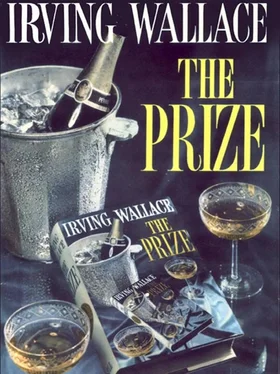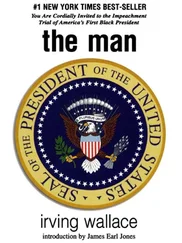Suddenly, she ground out the remnant of her cigarette, pushed back her chair, and rose. Taking her purse, she said, ‘I’ll be right back. Don’t go.’
‘Never.’
His eyes followed her across the room. He saw that the three waiters were observing her, too. She moved like a mannequin, with fluid grace, tall, thin, hips slim, thighs and legs long, all elegant and aloof and slithering. As she walked, her legs, close together, provocative, stretched straight before her, the pointed pumps turned slightly outward, her smooth buttocks undulating in the manner of all practised mannequins. At last, she pirouetted around a corner and was out of view. Straight out of Elle or L’Officiel , Claude Marceau thought, all haute couture , clothes, face, figure, all glacial and unruffled and not merely mortal. Perhaps it was this that had attracted him first, the challenge of what was or seemed emotionless and unattainable and too near perfection.
Yes, this had attracted him first, he knew definitely, and what had held him, finally, against all caution and scientist’s reason, was not her public presence but her private behaviour. From the very first time, she had become a different person. Two weeks ago-when it had stimulated him beyond anything he had ever felt before-she had undressed before him, boldly, almost tauntingly, first slowly, the shoes, the long sheer stockings, the dress, the half-slip, and then faster and faster, the bra and garter belt and pants. Wholly naked to him, she had become a different person. Once stripped of fashion and pretence, once basic white flesh, and breasts considerable in circumference but stylishly flat, these accentuated by her elongated bony body, she had become pure animal. She shed with her apparel all vanity and studied sophistication. There remained no single artifice. In nudity, she withheld nothing, became the epitome of the French courtesan, displayed desire rawly, and enjoyed the sexual coupling completely without pretending a special gift in giving but revealing a passionate gratefulness in receiving.
Although Claude had possessed her half a dozen times in the two weeks, the anticipation of it-the transformation-again aroused him more keenly than ever, and he longed for her to return and be off with him. As he called to the waiter for the check, his mind was still on the miracle of their union. He had a certain pride in the affair. It was not only her evident desirability and beauty, which, after all, he could not show the world, but the fact that she enjoyed him.
He was forty-six, and she twenty-seven, and he had been an intellectual and a man of science since his youth. He had been too long devoted to tubes and bottles and counters that smelled of acid, and too devoted to introspections, to regard himself as débonair or attractive, although now, in these last weeks, he had felt attractive. His hair was bushy and greying, his broad face not yet fleshy but regular except for the narrow eyes and beaked French nose, his body inclined to weight and called by one newspaper ‘heavy-set’, but still strong and firm, so that he continued to play tennis once a week and play boule in the Bois twice a week. She could have younger men, gayer men, richer men, and certainly unmarried men. Yet she had him and wanted no more. Here was another mystery of chemistry that he and Denise must investigate. He realized, immediately, that he had subconsciously thought of the name of his wife. That was improper, and he erased her name. He would not think of her on this night. He was in no mood for brooding over his culpability.
Again, attempting to see himself through Gisèle’s eyes, he tried to weigh his value. Assets: intelligence, sensibility, modest fame. Liabilities: age, a certain stodginess, married.
About to continue his reverie, he saw Gisèle approaching, the bouffant impeccable, the bowed lips wine, the long legs crossing in lazy strides against her tight purple skirt. He tried to rise as youthfully as possible, opening his wallet and counting out the necessary francs and despite service compris a generous tip to the serving people who would understand the bribe.
He took up her full-length natural brown mink coat, held it as gallantly as a cloak, and she spun gracefully into it, coolly enwrapped and beauty enhanced.
Outside, in the balmy Parisian night, they stood in the dark, narrow street, her hand in his, gazing at the great fenced Halle aux Vins.
‘I should like to go in there some night and sample everything,’ he said.
‘We do not need that,’ she said, squeezing his hand.
‘Still want to walk a little?’
‘Oh, yes. The Seine.’
There were small dangers in this, he knew, but here was a night in November such as the one during which they had met, really met, in September. So he agreed.
She linked her arm in his, and they strolled leisurely across the rue des Chantiers to the Boulevard St.-Germain, glanced into the corner café to see if there were anyone they might recognize, then crossed and walked to the Quai de la Tournelle. They crossed again to the low stone wall above the Seine, passed several closed wooden bookstalls, and halted to survey the placid river. On the river, like a floating chandelier, one of the bateaux-mouches , its curious glass dome shining in the half-moon, approached. Beyond it, the lights of the city were spectacular, and to the left, they could see the towering bright mass of Notre-Dame.
He nodded at the sight-seeing boat. ‘I have never been on a bateau-mouche . Have you?’
‘Several times. It is wonderful fun.’
‘I had always supposed it was for tourists-’
‘It is for us first, the way the Seine is.’
‘Yes. Some night, let us do it. I almost feel like a tourist anyway-everything new-’
They observed the boat again, and then, automatically, without the exchange of a word or pressure of their hands, they resumed walking toward Notre-Dame. The air seemed cooler now, and for Claude, this was evocative, conjuring up the first night that he had met Gisèle. Actually, he had seen her before he had met her. He had seen her in the late summer.
It was a time when his life had become directionless and monotonous, and he had been possessed of a nervous restlessness. The preceding six years had been different, for there had been a luminous goal, and a total dedication to its achievement. Going back the six years, he remembered that the goal had been established by a chance remark Denise had happened to make one noon.
He and Denise had become interested-possibly an unconscious reaction to their own personal inability to conceive offspring-in genetics, in the biological processes of perpetuating the race, and specifically in the effect of chemicals on chromosomes and genes. They had, as so many scientists before them, experimented with the Drosophila fly. They had attempted to induce artificially changes of the genes, as a means of predetermining or controlling the future sex of offspring. This work in mutations had not gone far, and had not been original, and Claude and Denise were discouraged on that fateful day when they joined several fellow workers lunching in the office next to the laboratory. During the repast, someone had mentioned a Russian paper devoted to advances made in transplanting a female ovum, and this had stimulated a heated discussion on heredity and sperms and fertilized eggs. Denise, in one of her infrequent fanciful moods (occurring whenever she was quietly desperate), had remarked playfully, ‘Suppose it were possible to preserve the living spermatozoon of a Charlemagne or an Erasmus, or the unfertilized egg of a Cleopatra, and implant them today, by modern means, centuries after their donors were dead?’ The fancy had been electric. Claude and Denise had continued to speculate upon it first, romantically, and, at last, scientifically.
Читать дальше












